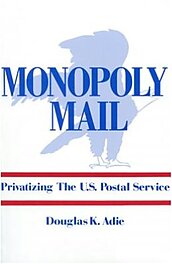First-class postage has risen from 6 cents in 1971 to 25 cents today, but despite the continual price increases, service has deteriorated. By its own admission, the U.S. Postal Service takes much longer to deliver first-class mail than it did in the 1960’s.
In this volume Ohio University economist Douglas K. Adie details the Postal Service’s failings — an inability to innovate, soaring labor costs, huge deficits, chronic inefficiency, and declining service standards — and contends that ending its monopoly over first-class mail delivery would eliminate them. He notes that whereas monopoly breeds inefficiency, high costs, and stagnation, competition would produce efficiency and innovation.
Adie offers a provocative plan to privatize and deregulate the Postal Service in order to permit competition within the industry. Having described how consumers, entrepreneurs, and workers have benefited from the partial deregulation of other industries, he forecasts tremendous gains from deregulated letter delivery. He concludes that privatization and deregulation would enable the Postal Service to enter the 21st Century as a modern, efficient company that could provide American consumers with the kind of mail service that a complex economy demands.
